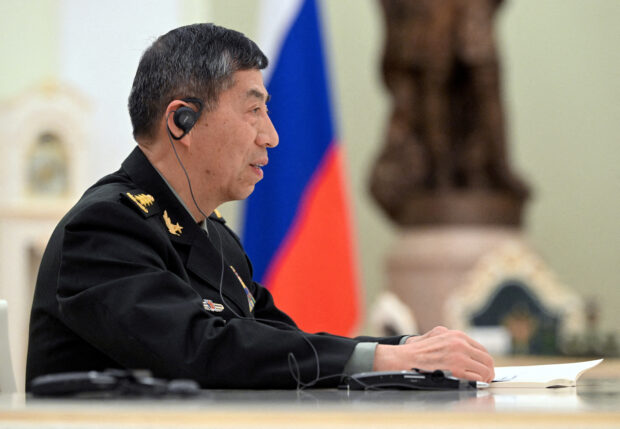The public face of China’s military under corruption probe

Chinese Defence Minister Li Shangfu attends a meeting with Russian President Vladimir Putin and Defence Minister Sergei Shoigu in Moscow, Russia, April 16, 2023. Sputnik/Pavel Bednyakov/Pool via REUTERS/File Photo
BEIJING — General Li Shangfu, a veteran of China’s military modernization drive, rose through the ranks to become defense minister this year. Within six months, he disappeared under the cloud of a corruption probe.
Li grew to prominence under President Xi Jinping’s pursuit of military might during his decade in power while China’s relations with the United States soured over issues including Taiwan, the democratically governed island that Beijing claims.
But part of Xi’s drive to improve his fighting force has been to stamp out corruption that has long plagued China’s military and other state institutions.
A leader China’s space and cyber warfare development and then head of military procurement, Li, 65, was elevated to defense minister in March.
After he disappeared from public view last month and missed meetings, including with at least once foreign counterpart, Reuters reported on Friday that Li was under investigation in a broad probe over procurement of military equipment.
Article continues after this advertisementReuters could not ascertain what purchases were under scrutiny. China’s defense ministry did not respond to a request for comment. The foreign ministry’s spokeswoman told reporters on Friday she was not aware of the situation.
Article continues after this advertisementWhile his post as defense minister is viewed as largely diplomatic and ceremonial, Li is one of China’s five state councillors, a cabinet position that outranks other ministers.
He also has a more public role than others on the Central Military Commission, China’s top defense body, commanded by Xi. His relations with the United States, which sanctioned Li in 2018 for buying weapons from Russia, have defined his spell in the role.
Sanctions or dialogue
Li’s tenure began as Washington was pushing to restore military dialogue and communications that Beijing froze in reaction to a visit last year to Taiwan by the then-speaker of the House of Representatives, Nancy Pelosi.
Chinese officials have repeatedly said the U.S. should drop sanctions on Li if it wants to resume high-level military communications – a risky dynamic as Washington and Beijing spar over issues ranging from trade to Taiwan.
Beijing in June declined a U.S. request for a meeting with Defense Secretary Lloyd Austin at a high-profile annual security forum in Singapore. Their encounter ended with a handshake.
At the forum, Li warned that conflict with the U.S. would be an “unbearable disaster” but that China sought dialogue over confrontation.
In mid-August, he met high-ranking officials in Russia and Belarus, a show of support for countries diplomatically isolated by the West in the wake of Moscow’s invasion of Ukraine.
Li was last seen in Beijing on Aug. 29 delivering a keynote address at a security forum with African nations.
Technocrat origins
Li’s history as a technocrat – he is an aerospace engineer who worked on China’s satellite program – was helpful in trying to meet Xi’s goals for the People’s Liberation Army (PLA), experts say.
“The operational and technological background of the next Chinese defense minister is especially pertinent given that the PLA aims to become a world-class military by 2049,” said James Char, a security scholar at Singapore’s S. Rajaratnam School of International Studies.
In 2016, Li was named deputy commander of the PLA’s fledgling Strategic Support Force, an elite group tasked with accelerating the development of China’s space and cyber warfare capabilities.
He was then appointed head of the Equipment Development Department of the Central Military Commission. Li was sanctioned over the purchase of 10 Russian Su-35 combat aircraft in 2017 and equipment related to the S-400 surface-to-air missile system.
In July, the department took the highly unusual step of issuing a notice that it was looking to “clean up” its bidding process. It invited the public to report irregularities dating back to October 2017, when Li was at its helm. He ran the unit until October 2022.
Li’s term at the Central Military Commission highlighted his ties to Xi, who has strengthened his grip across the military. Some scholars believe Li has close ties to Zhang Youxia, a close military ally of Xi, whom Li replaced as head of the department.
Zhang was promoted to first vice chairman of the military commission during the Communist Party Congress last year, with Li following him onto the commission’s seven-person governing group.
Despite the uncertainty of Li’s absence, analysts say there is probably no shortage of senior military officials who could step into the figurehead role of defence minister. A bigger question is what priority Beijing will continue to place on China’s military diplomacy amid ongoing regional tensions.
RELATED STORIES